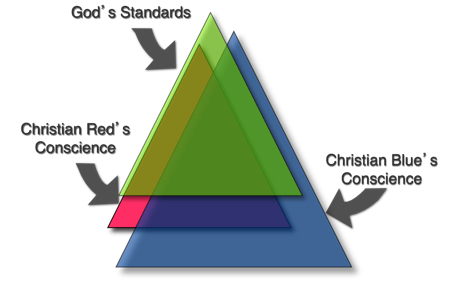I’m a big fan of helping Christians dwell together in peace and unity with a love for the truth. What do we do when Christians disagree about how to handle coronavirus? In seeking the peace of the church in this time, I’ve been thinking about the role of our conscience in Covid-19. What does conscience have to do with peacemaking and coronavirus? I’ll explain.
Formulating one’s conscience will help us know how to love God and our neighbor during this time. Our conscience can help answer questions such as: should I meet with other Christians and attend church in defiance of a stay at home order? Or the converse, should we still not meet for church, now that a stay at home order is lifted?
In Andrew Naselli and J.D. Crowley’s book on Conscience: What It Is, How to Train It, and Loving Those Who Differ, they mention that conscience is a gift that God gave us for our good and joy. There is great joy and freedom in living under the Lordship of Jesus Christ. The authors define conscience as your “consciousness of what you believe is right and wrong.” (p.42) Conscience produces different results for people based on different moral standards. No two people have exactly the same conscience, even a husband and wife. This is because our own conscience does not perfectly match God’s will. No person’s conscience matches God’s will exactly. Shouldn’t this truth give us pause? Shouldn’t it affect how we deal with each other with humility?

During this time of this coronavirus state of emergency, we need to do our best to calibrate our conscience to match God’s will. This includes studying the word of God to discern his will and understanding the world he made, so we can exegete God’s word and apply it to our current situation. So there is truth inside the Bible and truth outside of the Bible. Wisdom would have us respond differently if Covid had a mortality rate of 0.1% versus 20%. How we love our neighbor will look different in different situations.
As we seek to dwell together in love and unity during Covid-19, we must remember that we should never encourage a Christian to violate his or her conscience. Nor should we violate our own conscience. As Martin Luther stated, to go against conscience is neither right nor safe. Another way of putting it is that whatever does not proceed from faith is sin (Romans 14:23).
Christian unity does not require uniformity in all levels of conscience. Some truths are more important to agree on (1 Corinthians 15:3). As Naselli and Crowley explain, there needs to be a level of theological triage to determine what is an essential or non-essential Christian conviction. In seeking the unity of the church, we need to understand if our disagreement is on a primary, secondary, or third-level issue.
Primary issues are those like the incarnation, the death and resurrection of Christ. Secondary issues are issues that create reasonable boundaries such as baptism or view of women in church leadership roles. These issues often create divides between denominations but Christians with second-level disagreements can still work together for the gospel. Consider R.C. Sproul and John MacArthur working together in previous years despite their disagreement on baptism. Third-level issues are another step down and can be referred to as matters of conscience. These matters are important and answer practical questions, but members of the same church should be able to disagree on these issues without that being a hinderance to fellowship with one another.
Third level matters of conscience may cover topics such as: Is it ok to go to a restaurant on a Sunday? Should women wear head coverings in church? Should kids go to private or public school? Can Christians drink alcohol? Can Christians ever lie? What if I’m hiding Jews and I’m lying to a Nazi? Should Christians date or court before marriage? What about arranged marriages? In these matters of conscience within a church body, we should expect disagreement and learn to live with those differences. We should seek to honor God and fulfill the law of love to magnify the gospel in response to our differences.
We have a unique opportunity to help people develop and think through conscience issues during Covid-19. In doing so, we can help preserve the peace and purity of the church. Our conscience can err in two ways, by being over sensitive or under sensitive. As we come to understand God’s revealed will more and more, we calibrate our conscience to reflect what God’s word teaches us. While these times can seem confusing and uncertain, 2 Peter 1:3 comforts us with the hope that God’s divine power has granted to us all things that pertain to life and godliness, through the knowledge of him who called us to his own glory and excellence.
Here are some examples of possible Covid-19 conscience issues we may face at this time:
- A church member might have an oversensitive conscience and feel guilty about missing church week after week. A pastor can explain to him that he should not have a guilty conscience for “disobeying” Hebrews 10:24-25 because there are exceptions to the command of corporate worship. He can help his member understand the correlation of Matthew 12:1-7 to works of necessity and works of mercy and understand God’s providence, even in a virus.
- A Christian husband wonders whether he can should defy an unreasonable governor’s stay at home order in order to obey God’s command to provide for his family? He wonders how he can love his family by providing food on the table.
- Or consider if a congregation feels compelled to meet for worship out of obedience to God despite a governor telling them not to. How does a person obey the Lord with a clean conscience? Civil disobedience must be motivated out of love and obedience to Christ, not driven by pragmatic concerns.
- Or consider that someone in our congregation may get sick when we re-open a church. How can we act now in a way so that we have clean consciences later if someone does get Covid-19 after reopening? And consider that this virus may be here to stay for years.
Our prayer is that in the church, there will be unity in Christ as pastors lead their congregations in this difficult time. Covid-19 provides Christians with a unique opportunity to glorify God in how we love one another and how we love the greater community. They will know we are Christians by our unity and love.
Here are a few tips on how we can relate to Christians when our consciences disagree:
Assume the best about other Christians. Assume that your brothers and sisters in Christ have a conscience. We should assume our Christian brothers and sisters want to glorify God by loving the Lord with all their heart, mind, and soul, and strength, and desire to love their neighbor as themselves (Mark 12: 28-31). We should also assume our own conscience and grasp of the truth is not perfect! Those that arrive at different conclusions than us can be respected, understood, and loved even though we think they may be wrong.
Allow God to calibrate your conscience. Being willing to calibrate your conscience means having humility. Pastor Kevin DeYoung reminds us to have some “epistemic humility,” being mindful of what we truly know and of all the things we don’t really know. Christians should consider the input of experts such as doctors, economists, and lawyers. Speak with Christians that you may disagree with. Recognize that conscience calibrations can take time as you study the issue and be patient with others in their own sanctification.
Read God’s word and study passages that are relevant to our situation. You might find yourself reading Hebrews 10:24-25 and Romans 13. Or you might ponder if civil disobedience glorifies God by studying the apostle Peter in the book of Acts or reading the Westminster Larger Catechism to see how Christians of old have understood the practical applications of the 4th (Remember the Sabbath Day) or 6th (Thou Shalt Not Kill) Commandments. Then ask God what he requires of you to love Him and your neighbor in this time of fear. God’s perfect love casts out fear (1 John 4:18)!
Avoid violating your own conscience or the conscience of others. Romans 14 encourages us to do whatever we do in faith and not cause others to stumble in our Christian liberties. This means we deal gently with others when we disagree and are willing to restrain our liberties for the sake of our brother. Those with strong consciences should avoid arrogance and those with weak consciences should avoid judgmentalism. Church leaders will want to shepherd their flock and explain the facts and Scriptures that influenced their leadership decisions so the congregation can follow their lead with confidence and faith.
Prayer: Dear Lord, may we go forth with a love that issues from a pure heart and a good conscience and a sincere faith (1 Timothy 1:5). Let us submit to your Lordship with joy and obedience, having our hearts sprinkled clean from an evil conscience and our bodies washed with pure water, because of Christ’s atoning sacrifice. May we magnify the gospel of Jesus Christ in word and deed and offer hope to this needy world in this time.

For further study listen to:







Pingback: Peacemaking in the Church: Covid-19 and Conscience – BeReconciled.com / Mediation for Virginia Beach, Tidewater, and Beyond – Reformed faith salsa style